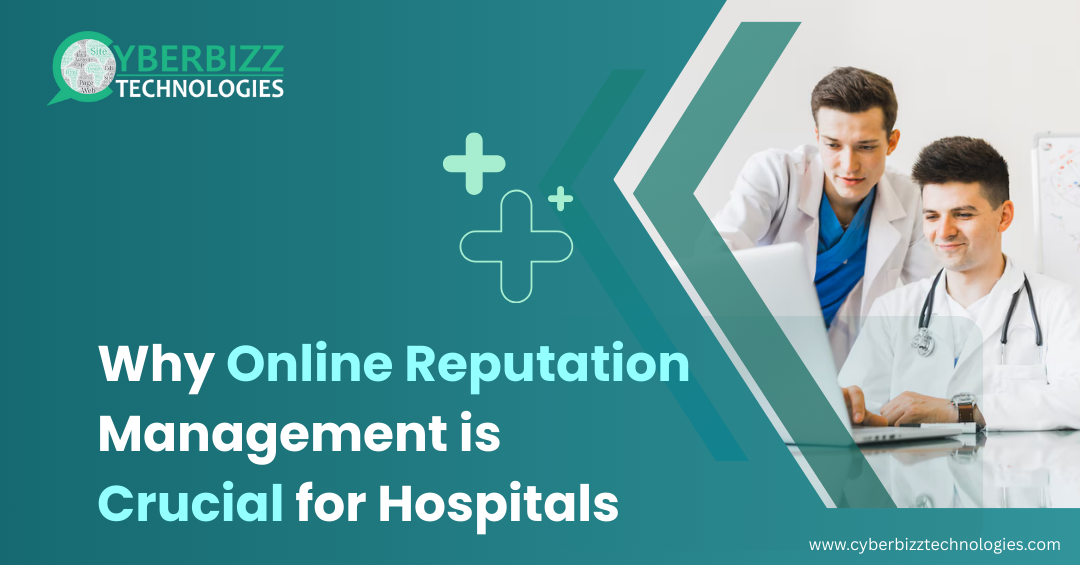
Why Online Reputation Management is Crucial for Hospitals
Introduction
In today’s digital world, a hospital’s online reputation directly impacts patient trust, appointment bookings, and overall success. With 90% of patients reading online reviews before choosing a healthcare provider, hospitals must actively manage their online presence. A single negative review or poor online experience can deter potential patients, while a strong reputation can establish credibility and attract more visitors.
This blog explores why Online Reputation Management (ORM) is crucial for hospitals and how they can maintain a positive image.
1. Patients Trust Online Reviews Like Personal Recommendations
Why It Matters?
-
72% of patients use online reviews as the first step in choosing a hospital.
-
Positive reviews increase appointment bookings and build trust.
How to Manage?
✔ Encourage satisfied patients to leave reviews on Google, Practo, and Facebook.
✔ Respond to negative reviews professionally, offering resolutions.
✔ Showcase testimonials on the website to build credibility.
Example: A hospital with 500+ positive reviews saw a 35% increase in patient inquiries compared to a competitor with fewer reviews.
2. A Strong Online Reputation Enhances Patient Confidence
Why It Matters?
-
Hospitals with high ratings attract more patients.
-
A well-maintained reputation reassures patients about quality care and safety.
How to Manage?
✔ Highlight doctor credentials, patient success stories, and hospital achievements.
✔ Keep hospital profiles updated on medical directories and social media.
✔ Share positive patient experiences through videos and blog posts.
Example: A multi-specialty hospital shared real patient recovery stories on social media, boosting engagement and inquiries by 50%.
3. Negative Reviews Can Damage a Hospital’s Reputation
Why It Matters?
-
Unaddressed complaints create a negative perception.
-
Patients avoid hospitals with low ratings and bad reviews.
How to Manage?
✔ Monitor Google, Facebook, and healthcare review sites for feedback.
✔ Address negative feedback quickly, showing concern and offering solutions.
✔ Improve hospital services based on patient feedback.
Example: A hospital with poor service reviews improved its appointment system, reducing wait times and earning higher ratings within six months.
4. Online Reputation Affects Local SEO Rankings
Why It Matters?
-
Google prioritizes hospitals with high ratings in local search results.
-
A hospital’s Google My Business (GMB) profile with good reviews ranks higher.
How to Manage?
✔ Encourage patients to leave reviews on Google and healthcare directories.
✔ Optimize the hospital’s GMB profile with accurate details and photos.
✔ Respond to all reviews to increase engagement.
Example: A hospital with consistent 4.5+ star ratings ranked #1 in Google’s Local Pack, leading to increased patient visits.
5. A Good Reputation Increases Patient Retention & Referrals
Why It Matters?
-
Happy patients return and refer others.
-
A strong reputation builds long-term patient trust.
How to Manage?
✔ Maintain high-quality care and patient satisfaction.
✔ Follow up with patients post-treatment for feedback.
✔ Offer a referral program to encourage word-of-mouth marketing.
Example: A hospital introduced a patient referral program, leading to a 20% increase in repeat visits.
6. Social Media Impacts Hospital Reputation
Why It Matters?
-
Patients discuss experiences on platforms like Facebook and Instagram.
-
Hospitals with active, engaging social media build stronger connections.
How to Manage?
✔ Post health tips, doctor Q&A sessions, and patient stories.
✔ Address negative comments professionally.
✔ Run reputation-building campaigns (e.g., "Meet Our Expert Doctors").
Example: A hospital that engaged with patients on social media daily saw a 60% increase in positive brand perception.
7. Crisis Management: Handling Medical Negativity Online
Why It Matters?
-
A single viral negative story can damage trust.
-
Quick, professional responses can prevent reputational damage.
How to Manage?
✔ Have a crisis management plan in place.
✔ Address false information quickly with factual responses.
✔ Apologize sincerely when needed and offer corrective measures.
Example: A hospital responded to a misdiagnosis complaint online, explained the corrective steps taken, and restored patient trust.
8. Reputation Management Leads to More Appointment Bookings
Why It Matters?
-
Hospitals with high ratings receive more appointment requests.
-
Patients prefer hospitals with positive online interactions.
How to Manage?
✔ Ensure consistent positive patient experiences.
✔ Invest in reputation monitoring tools (Google Alerts, Brand24).
✔ Use AI chatbots for instant patient support.
Example: A hospital’s automated patient support system reduced response time, leading to a 25% rise in online appointments.
Conclusion: Protect & Enhance Your Hospital’s Online Reputation
In 2025, a hospital’s online reputation is as important as its medical expertise. Proactively managing reviews, engaging with patients online, and addressing concerns professionally can increase trust, patient retention, and hospital success.
Key Takeaways:
✔ Monitor & manage online reviews on Google, Facebook, and healthcare platforms.
✔ Respond to negative feedback professionally and use it to improve services.
✔ Leverage social media & reputation management tools to maintain trust.
✔ Encourage patient testimonials & referrals to boost credibility.
Need help with Online Reputation Management for your hospital? Contact us today!
Content Created By:

CyberBizz Technologies
Team - Content Curator